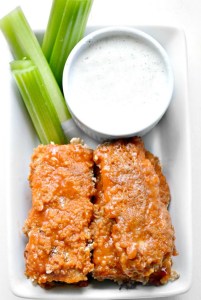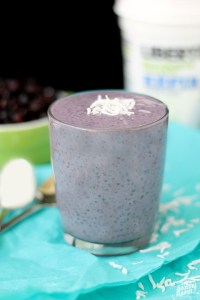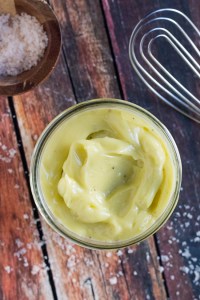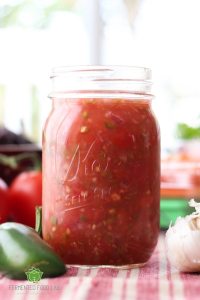optional screen reader

Fermented foods have started gaining traction, not just because they’re tasty, but also because according to WebMD, they could be good for our digestive systems, potentially reducing risk of diseases like diabetes and IBS. Fermented drinks like kombucha are on all the grocery shelves, and people have even been purchasing their own scoby (symbiotic culture of bacteria and yeast) to make kombucha at home, which made us wonder — what other fermented foods are totally attainable for the home chef?
It turns out plenty! The internet has seemingly endless resources for whatever kind of fermented food you’re interested in trying. Sauerkraut? Yep. Kimchi? Of course. But even foods you may not have considered for fermenting are possibilities, like ketchup or jalapeños.
We rounded up the fermented recipes that sounded the most interesting to try, like blueberry kefir and cinnamon roll sourdough. Get them right, and we’ll have some of the happiest guts around. Get them wrong, and… well, there’s always the grocery store.
A version of this article was originally published June 2018.
Sauerkraut

Super-popular in Germany — you’ve probably seen it at American barbecues or on top of a bratwurst — sauerkraut is fermented cabbage. This recipe uses red cabbage for extra visual appeal.
Kimchi

Kimchi is a Korean dish of spicy fermented vegetables, usually cabbage or radish. This recipe uses cabbage. You’ll want to start the fermenting process about a week before you plan to eat it.
Miso

Miso is fermented soybeans and barley or rice malt, most often used in Japanese cooking, and while you can make the paste yourself, the stuff you can buy at the store is great. Instead, spend your time experimenting with different recipes — like these miso-glazed grilled zucchini spears — perfect for summer.
Tempeh

Tempeh is lightly fermented soybeans that are formed into blocks and often used as a meat alternative. Again, it is something you can make on your own, but you’re better off buying premade tempeh and focusing your experimenting around exciting recipes, like this recipe for baked buffalo tempeh tenders.
Yogurt

You already know about yogurt, of course, but this is one staple that can be worth making on your own. It takes about 15 minutes, and you can even make your own yogurt cups for a grab-and-go breakfast.
Lassi

Once you’ve mastered yogurt (or even if you’re just gonna buy it from the store, no judgment) give Lassi, an Indian drink, a try. It’s traditionally savory, but if you’re looking for something that might feel more familiar, start with this mango lassi recipe.
Sourdough

Bread is fermented? The answer when it comes to sourdough is yes. Sourdough is made through the fermentation of dough via bacteria and yeast. Being able to make your own sourdough starter is a skill all on its own and takes some experience to master. If you’re not a big bread fan, that doesn’t mean it’s a skill you should skip — you could, for example, make these amazing sourdough cinnamon rolls.
Kefir

Kefir is kind of like a yogurt drink and is traditionally fermented cow’s milk (although there is also something called water kefir, which is dairy-free.) There are all kinds of things you can make with kefir, like butter, cheese and puddings. This blueberry kefir chia pudding, for example, looks delicious.
Fermented Ketchup

Yep, even some of your favorite condiments can be fermented, like this relatively simple recipe for fermented ketchup.
Fermented Jalapeño

Great for adding to nachos, sandwiches or anywhere else you want a little heat, these fermented jalapeños only take about 20 minutes to make.
Fermented Mayo

Another condiment that can be fermented, this mayo uses a small amount of whey to keep it fresh for up to a month.
Fermented Cinnamon Apples

This recipe uses a little bit of fermented tea to preserve cinnamon apples, meaning you can have a healthy apple pie-flavored snack whenever you want.
Fermented Honey Garlic

It takes about a month for the honey and garlic to ferment, but then you can add this tasty food to marinades or glazes.
Fermented Salsa

Pickle juice or juice from sauerkraut is what gives this salsa its fermentation.
Beet Kvass

Beet kvass is a fermented beverage made from beets. It’s kind of like kombucha but with beets instead of tea.
optional screen reader
Leave a Comment
More Stories from Food & Recipes
Food News
Trader Joe’s Shoppers Can’t Stop Raving About the Store’s New $4 SweetTreat
by Stephanie Andrade
Food News
Aldi Is Dropping the Tastiest St. Patrick’s Day Treats — There Are the Must-TryItems
by Olivia Harvey
Food News
by Olivia Harvey
Recipes
by Sydni Ellis
Recipes
The Pioneer Woman’s Slow-Cooker Sunday Stew Is the Easiest Comfort Food Recipe We’veSeen
by Sydni Ellis














